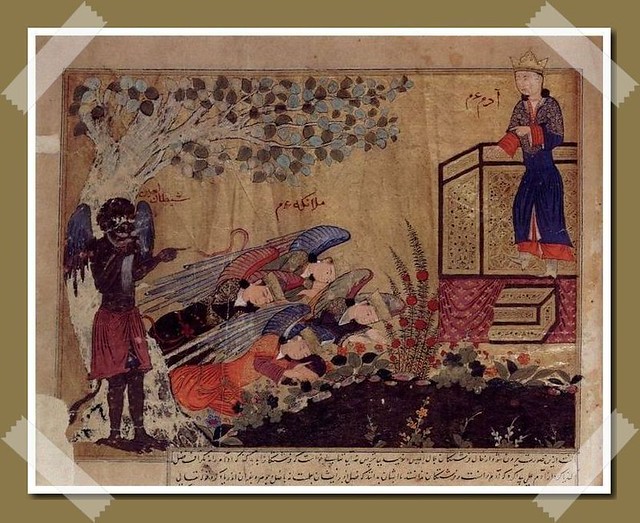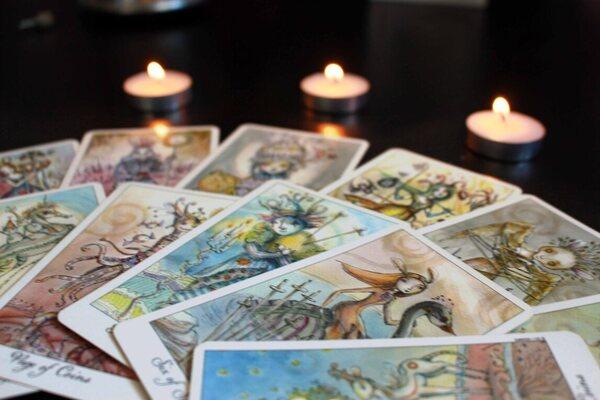Iblis

In Islam, the Devil. Iblis is Arabian for “despair.” The exact origin and nature of Iblis are uncertain. His name is the primary name for the Devil; he is also described as the chief and father of the Djinn and an Angel. He can assume any form, but he is most frequently portrayed as a vain entity who has the head of an ass and is decorated with peacock feathers (see Adramelech).
Iblis is mentioned nine times in the Qur’an; seven of the references concern his fall from God’s grace. His other name, Shaytan, is used in context of his rebellion against God.
Sura 18:50 in the Qur’an states that Iblis “was one of the Djinn, and he broke the command his Lord.” Like other Djinn, Iblis was created by God of smokeless fire. Suras 7:12 and 38:76 refer to his creation from fire. However, the Qur’an also indicates that Iblis was treated as an angel. When Allah created Adam, he ordered all the angels to bow down and worship him. Iblis was among those who refused, claiming that a being made of dust was beneath him, a being of fire. Allah cursed Iblis for his pride and expelled him from heaven. Iblis persuaded Allah to delay further punishment until the Day of Judgment. God gave him the right to roam the earth, tempting people, and to destroy those who yield to temptation. He cannot compel people to sin but only lure them to make the choice. He is aided by the Shaytan, also the name of a type of Djinn, who serves under him. Ultimately, Iblis is doomed to Hell along with the souls he corrupts. He haunts ruins and eats unblessed food until Judgment Day.
Another tradition holds that Iblis was one of the original Djinn, taken to heaven as a prisoner. He was made a judge of Djinn, a job that he performed well for 1,000 years and poorly for 1,000 years. He was then rehabilitated but refused Allah’s command to worship Adam and was punished.
In another legend, in a time before the creation of humankind, Allah sent his angels down to Earth to destroy the Djinn, who were rebelling against divine laws. The angels killed most of them and captured Iblis, whom they took up to heaven and educated. The remaining Djinn formed a new nation. Iblis, who wanted power, left heaven to become their king. They called him AZAZEL. In the mystical tradition of the Sufis, Iblis refused to bow to Adam because he could only bow to God. Thus, Iblis represents the perfect lover, a model of loyalty and devotion who would rather be separated from God and God’s will than united with God against God’s will. In a 14th-century Syrian legend, Iblis actually assisted in the creation of Adam by gathering sweet and salty matter from the earth.
Another story tells how Iblis tempted Eve. He succeeded in smuggling himself into paradise by promising any animal who carried him in that he would bestow upon it three magical words that would guarantee immortality.
The Serpent agreed and carried Iblis into paradise hidden in its mouth. Iblis spoke to Eve from within the mouth. Iblis is both male and female and can impregnate himself. Everytime he celebrates humans’ rebelling against God, he lays two eggs that hatch as Demons.
FURTHER READING:
- Hyatt, Victoria, and Joseph W. Charles. The Book of Demons. New York: Simon & Schuster, 1974.
- Kelly, Henry Ansgar. A Biography of Satan. New York: Cambridge University Press, 2006.
- Mack, Carol K., and Dinah Mack. A Field Guide to Demons: Fairies, Fallen Angels, and Other Subversive Spirits. New York: Owl Books/Henry Holt, 1998.
- Russell, Jeffrey Burton. Lucifer: The Devil in the Middle Ages. Ithaca, N.Y., and London: Cornell University Press, 1984.
The Encyclopedia of Demons and Demonology – Written by Rosemary Ellen Guiley – Copyright © 2009 by Visionary Living, Inc.
![]()
Iblis (slanderer) Satan in Islamic folklore, originally an angel called Azazel or al-Haris; he is the father of the Djinn. When Allah was forming man, he took clay and after shaping it left it to dry for some 40 days (or 40 years, according to some Islamic versions of the myth). All of the malaika, or angels, who were created from rays of light, came to see Allah’s new creation. Iblis, one of Allah’s most important angels, appeared among them. He looked at the new creation and, knowing that Allah intended to make it more important than any angel, kicked it with his foot until it resounded. Allah then called all
of the angels to come and worship Adam. Iblis refused because, as the Koran (sura 2) phrases it, he “was puffed up with pride.” When Allah in anger cast Iblis out of heaven, the angel cried: “Allah, grant me time. Do not banish me to outer darkness yet. Let me tempt Adam and his sons. Then we will see if they have faith!” “I will give you until the Day of Judgment,” Allah replied. “When that day comes, you will regret your evil deeds and pay dearly for them. You will be cast into a dark pit, never again to harm any souls. Now, out! Leave heaven.” Since that day Iblis has been tempting the sons of Adam to sin against Allah. Iblis is the father of Teer (Tir), the Demon who brings about calamities, injuries, and losses of various kinds; El-Aawar, who encourages men to live in debauchery; Sot (Sut), who gives men the desire to lie; Dasism, who causes husbands and wives to fight with one another. (Harut and Marut, the Brothers of Iblis, also cause division between husband and wife.) Iblis is also the father of Zeleboor (Zalambur), who hovers over places of traffic, causing accidents and mischief. Since the invention of the automobile this Demon has been kept astonishingly busy. In Western literature Iblis appears in William Beckford’s novel Vathek, an Arabian Tale.
SOURCE:
Encyclopedia of World Mythology and Legend, Third Edition – Written by Anthony S. Mercatante & James R. Dow
Copyright © 2009 by Anthony S. Mercatante







